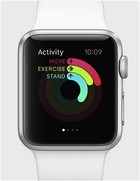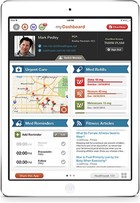10 Requirements for Personal Information in Health & Fitness Apps and Patient Portals
Personal Health Records Will Flip Control in the Healthcare Industry from Payers to Patients
Customers want more control over their health and medical information. There’s a new wave of health & fitness apps enabled by wearable devices and smartphones. What are the minimum viable product (MVP) requirements for apps and portals that provide access to personal health information? We consult a technology visionary—16 years ago--for some useful answers. Here are the 10 things that your health and fitness apps and patient portals need to be able to do.
NETTING IT OUT
Mobile devices: smartphones, smart watches, and other wearable technology encourage us to monitor our health and fitness activity. This is a good thing. But these personal monitoring apps need to talk with one another and, perhaps, also be able to integrate into our doctor’s electronic medical records’ systems.
Consumers are now taking control over more and more of their health information. They want access to their doctors’ and hospitals’ and insurers’ medical records. After all, they are OUR medical records!
 It’s time to step back and look at the requirements for Personal Health Records. What information should always be private? What information do we want to be able to share with our physicians? How will we keep it secure and synchronized?
It’s time to step back and look at the requirements for Personal Health Records. What information should always be private? What information do we want to be able to share with our physicians? How will we keep it secure and synchronized?
To wrap my mind around these issues, I remembered a conversation I had with my father 16 years ago. His requirements in 1998 are still a pretty good blueprint for Personal Health Records today.
PATIENTS ARE TAKING CONTROL OF THEIR HEALTH INFORMATION
Personal Health Records Will Drive the Future of Collaborative Medicine
I believe we’re at the beginning of a sea change in medicine. We’re entering the era of personalized medicine (with treatments tailored to us based on our genomes). But we—the patients and families—have already embarked on a healthcare revolution. We’re taking control of our data—our medical charts and medical histories: Demanding access to them; insisting on being able to correct inaccuracies in them; annoyed when we can’t receive, view, and share test results in digital form. This is a good thing. As in other industries, when the customers gain access to the information that affects them, the information becomes more accurate and more understandable. The processes that rely on that information become more transparent and streamlined. People are able to collaborate better around that information in order to achieve improved outcomes.
© 2014 HealthSpek
HealthSpek is one of the leaders in the Personal Health Record markets. You can customize the dashboard on your mobile device to focus on the information you care about right now. You can download information from an Electronic Medical Record and give your physician password-protected access to your Personal Health Record.
We’ll Move from Insurer-Based Data to Patient- and Physician-Shared Information
In the U.S., many of the requirements for moving to electronic medical records are driven by our reimbursement processes. We rely on health insurance—both private and public—to pay our medical professionals for the services we receive. Therefore, the information about each doctor’s visit, lab test, or prescription has to be entered into a system and correctly coded so that these insurers can correctly pay for the services provided. That’s why, in the U.S., patient privacy is protected by HIPAA—the Healthcare INSURANCE Portability and Accountability Act. HIPAA is administered by the Office of Civil Rights within the Department of Health & Human Services. (It’s not our information that needs to be private, yet portable; it’s the insurer’s information about each patient that needs to be protected, yet portable.)
But, even though HIPAA addresses the needs of the payer rather than the customer, end-patient, there’s good news. The Office of Civil Rights (OCR) wants to be sure that every American knows you have a legal right to see and obtain copies of your health records, to be able to share those records with any provider you choose to, and the right to correct your health information. Leon Rodriguez, the director of the OCR, wrote in a memo on September 13, 2013:
“Health information is critical to all patients so that they can track their progress through wellness programs, monitor chronic conditions, communicate with their treatment teams, and adhere to their important treatment plans. Important tools like Electronic Health Records (EHRs) and Personal Health Records (PHRs) will make it easier, safer, and faster for you to get access to your health information and stay engaged. These tools help you become a true partner in your health care and wellness.”
~ Leon Rodriguez, Director, Office for Civil Rights
We are entering the era of patient empowerment...(more)
(Download the PDF to read the entire article.)
Sign in to download the full article
0 comments
Be the first one to comment.




